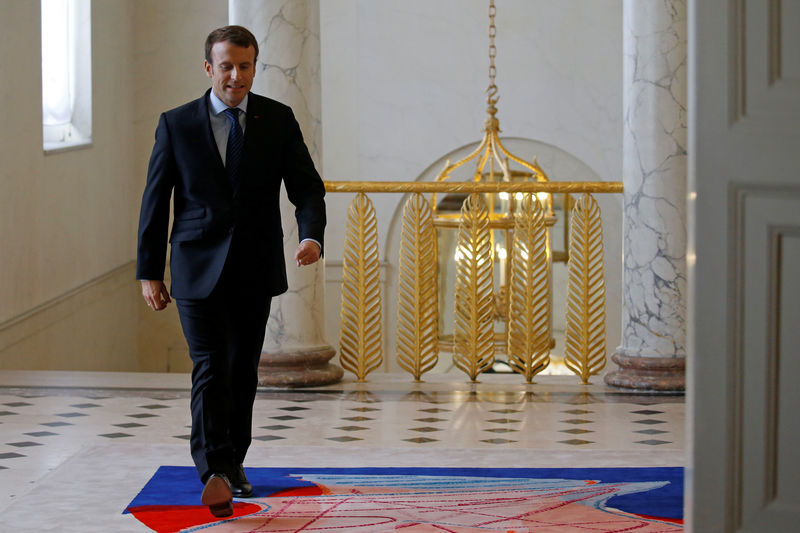By Ingrid Melander
PARIS (Reuters) - There was a time when angry French workers could down tools and take to the streets en masse to force ministers to back down. But things have changed, making President Emmanuel Macron's job of pushing through labour reforms that much easier.
Barely 26,000 attended one Paris rally on Tuesday to protest against the reforms, a fraction of the hundreds of thousands who went on strike in the heyday of French industrial action freezing activity in swathes of the economy.
French strikes are not what they used to be, reflecting a cooling in national attitude to union militancy plus a change in approach by Macron who flagged his reforms well in advance to union leaders who have in turn seen their powers decline.
This means the 39-year-old former investment banker has the best opportunity in generations to overhaul France's labour laws in his strategy to invigorate the EU's second-largest economy.
"Fundamentally it is not a very strike-prone country any more," said Bob Hancke, a labour relations expert at the London School of Economics. "In the mid-1990s, the joke was practically everyone had been a trade union member but no one ever stayed."
In 2015, companies in France lost 69 days to strikes per 1,000 workers. That was barely a fifth of what it was in the late 1990s and a far cry from the 1,000 days lost to strikes per 1,000 workers in the late 1980s.
The decline has accelerated since conservative President Nicolas Sarkozy passed a law in 2007 banning wildcat walkouts and forcing public transport unions to guarantee a minimum service during strikes.
While it is possible that protests will gain momentum when Macron unveils more hard-hitting reforms over the next year, including changes to unemployment benefits and pensions, things have so far played in his favour.
SHIFT IN POWER
Unionists and labour experts interviewed for this story said one critical factor is that big, nationwide strikes have achieved little for the average worker in the past two decades.
"Governments eventually realised they could just force things through," said Stephane Sirot, a professor at the Cergy-Pontoise university. An important point came in 2003, when a mass public-sector protest against pension reform failed to convince the government to budge, he said.
The last significant nationwide success enjoyed by unions was in 1995, when weeks of protests, also over pension reform, virtually brought the economy to a halt.
Since those strikes, which forced newly elected President Jacques Chirac to yield, major standoffs with successive governments have had mixed results.
"That's the main difficulty for unions," said Sirot. "They don't win anymore."
Taking part in a march in Paris against Macron's reforms on Tuesday, Sarah, an activist for 20 years in the Sud Nettoyage cleaners' union, said it was harder to get colleagues to strike.
"Many have been demotivated," she said. "With their heart they are with us but it's more difficult to mobilise them," she said, adding that the young were particularly ambivalent about the effectiveness of strikes and street protests.
Around 10 percent of French workers are unionised, according to labour ministry data, with the average member more likely to be older and with a permanent job.
At the same protest rally in Paris on Tuesday, Marie-Josee da Silva, a 49-year old hospital care-worker, said she was marching on principle rather than out of any real hope that the rally would convince the government to change course.
Tuesday's strike shut down some French schools and led to about a third of flights being cancelled at some airports but overall disruption was minimal.
A lack of unity among unions also dented protests against Macron's reforms, with many voters saying they believe the changes are vital to restore the health of the French economy.
The economy ministry said some 14 percent of state civil servants had been on strike and just 9.5 percent in local administration.
A WINNING STRATEGY?
Macron was careful to consult with unions ahead of the publication of his reform bill but he also offered small concessions. The most moderate union, the CFDT, which now has the largest membership, bought into Macron's proposals.
Jean-Claude Mailly, the leader of France's third-largest union, Force Ouvriere, told activists last month he had fought with the government behind closed doors for three months. But his union has also effectively accepted Macron's reforms.
Only the Communist Party-rooted CGT spearheaded street demonstrations against the loosening of employment laws.
When consultations with unions on changes to unemployment benefits and job training start on Thursday, the government will try the same approach, being firm on basic issues while offering some concessions.
Sirot and others said the strategy could work, but they also warned that with Macron planning to press ahead over the next year with even more contentious legislation, he may have won an early battle but not yet the war.
"There is a degree of resignation, people wonder if (taking part in rallies) is worth it, if they will be listened to," said Luc Berille, the head of Unsa, one of the public sector's main unions. "People don't necessarily walk off the job or protest, but there is an accumulation of resentment nonetheless, and that's good for no one."
For the current climate to prevail, the government needs to maintain contacts with unions, said Jean Grosset, who heads research on industrial relations at the Jean Jaures think-tank.

"The key is the sense of injustice," said Grosset, a former union leader, cautioning that if the government failed to tackle this sentiment, bigger protests could be triggered.